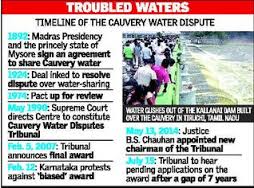The recent protests in Bangalore over the Cauvery water sharing brings to focus some deep set issues about the water crisis and sharing policies that have been chalked out thus far. More often than not water sharing in our country is a major political agenda, be it the Cauvery dispute, the Teesta issue or water dispute on the north western border states. But the fact is we need a long lasting solution more in the lines of the water sharing treaty for the Mekong Basin.
So far the popular strategy has been more piece-meal in nature. Even if we see the current Supreme Court directive on the Cauvery matter, it says, Karnataka was ordered to release 12,000 cubic feet of water per second every day to Tamil Nadu until September 20. The river is the main source of water for the state’s rice crops and disputes over water are common, especially when there are droughts or weak monsoons.
This also brings to focus the severe lack of a country wide irrigation policy with a greater focus on the myriad geographical diversity across the country. Apart from parts of Punjab and Rajasthan under the Indira Gandhi Irrigation projects and some parts of West Bengal covered through the Damodar Valley Project, there is a conspicuous absence of a uniform irrigation policy in a country whose economy is predominantly dependent on agriculture.
All of these instances clearly highlight the increased need for the centre to take a more assertive role in resolving the water disputes and shift the ambit of jurisdiction from the state governments to a more centralised regulatory body. In fact the Interstate River Water Disputes Act, 1956 (IRWD Act) enacted under Article 262 of Constitution of India provides a role for the Central government in adjudicating conflicts surrounding inter-state rivers that arise among the state/regional governments.[3] This Act further has undergone amendments subsequently and its most recent amendment took place in the year 2002. River waters use / harnessing is included in states jurisdiction. However, union government can make laws on regulation and development of inter-State rivers and river valleys when expedient in the public interest. When public interest is served, President may also establish an interstate council as per Article 263 to inquire and recommend on the dispute that has arisen between the states of India.
Perhaps this could be the best bet to douse the protests, disputes and loss of life and business arising out of the ad hoc water sharing policies that need a relook at regular interval given the uncertain nature of rains in our country.



Leave a reply